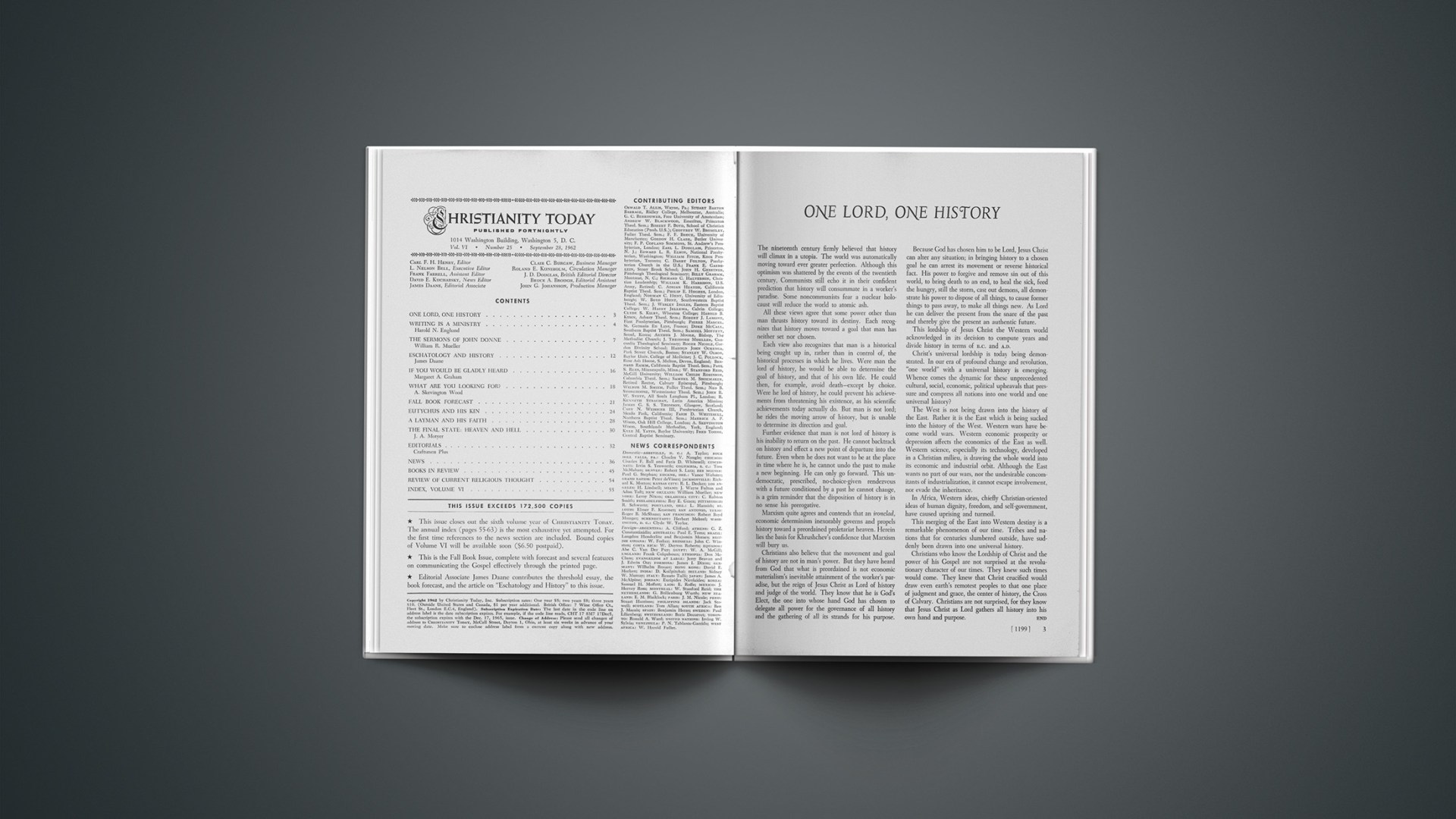The nineteenth century firmly believed that history will climax in a utopia. The world was automatically moving toward ever greater perfection. Although this optimism was shattered by the events of the twentieth century, Communists still echo it in their confident prediction that history will consummate in a worker’s paradise. Some noncommunists fear a nuclear holocaust will reduce the world to atomic ash.
All these views agree that some power other than man thrusts history toward its destiny. Each recognizes that history moves toward a goal that man has neither set nor chosen.
Each view also recognizes that man is a historical being caught up in, rather than in control of, the historical processes in which he lives. Were man the lord of history, he would be able to determine the goal of history, and that of his own life. He could then, for example, avoid death—except by choice. Were he lord of history, he could prevent his achievements from threatening his existence, as his scientific achievements today actually do. But man is not lord; he rides the moving arrow of history, but is unable to determine its direction and goal.
Further evidence that man is not lord of history is his inability to return on the past. He cannot backtrack on history and effect a new point of departure into the future. Even when he does not want to be at the place in time where he is, he cannot undo the past to make a new beginning. He can only go forward. This undemocratic, prescribed, no-choice-given rendezvous with a future conditioned by a past he cannot change, is a grim reminder that the disposition of history is in no sense his prerogative.
Marxism quite agrees and contends that an ironclad, economic determinism inexorably governs and propels history toward a preordained proletariat heaven. Herein lies the basis for Khrushchev’s confidence that Marxism will bury us.
Christians also believe that the movement and goal of history are not in man’s power. But they have heard from God that what is preordained is not economic materialism’s inevitable attainment of the worker’s paradise, but the reign of Jesus Christ as Lord of history and judge of the world. They know that he is God’s Elect, the one into whose hand God has chosen to delegate all power for the governance of all history and the gathering of all its strands for his purpose.
Because God has chosen him to be Lord, Jesus Christ can alter any situation; in bringing history to a chosen goal he can arrest its movement or reverse historical fact. His power to forgive and remove sin out of this world, to bring death to an end, to heal the sick, feed the hungry, still the storm, cast out demons, all demonstrate his power to dispose of all things, to cause former things to pass away, to make all things new. As Lord he can deliver the present from the snare of the past and thereby give the present an authentic future.
This lordship of Jesus Christ the Western world acknowledged in its decision to compute years and divide history in terms of B.C. and A.D.
Christ’s universal lordship is today being demonstrated. In our era of profound change and revolution, “one world” with a universal history is emerging. Whence comes the dynamic for these unprecedented cultural, social, economic, political upheavals that pressure and compress all nations into one world and one universal history?
The West is not being drawn into the history of the East. Rather it is the East which is being sucked into the history of the West. Western wars have become world wars. Western economic prosperity or depression affects the economics of the East as well. Western science, especially its technology, developed in a Christian milieu, is drawing the whole world into its economic and industrial orbit. Although the East wants no part of our wars, nor the undesirable concomitants of industrialization, it cannot escape involvement, nor evade the inheritance.
In Africa, Western ideas, chiefly Christian-oriented ideas of human dignity, freedom, and self-government, have caused uprising and turmoil.
This merging of the East into Western destiny is a remarkable phenomenon of our time. Tribes and nations that for centuries slumbered outside, have suddenly been drawn into one universal history.
Christians who know the Lordship of Christ and the power of his Gospel are not surprised at the revolutionary character of our times. They knew such times would come. They knew that Christ crucified would draw even earth’s remotest peoples to that one place of judgment and grace, the center of history, the Cross of Calvary. Christians are not surprised, for they know that Jesus Christ as Lord gathers all history into his own hand and purpose.










